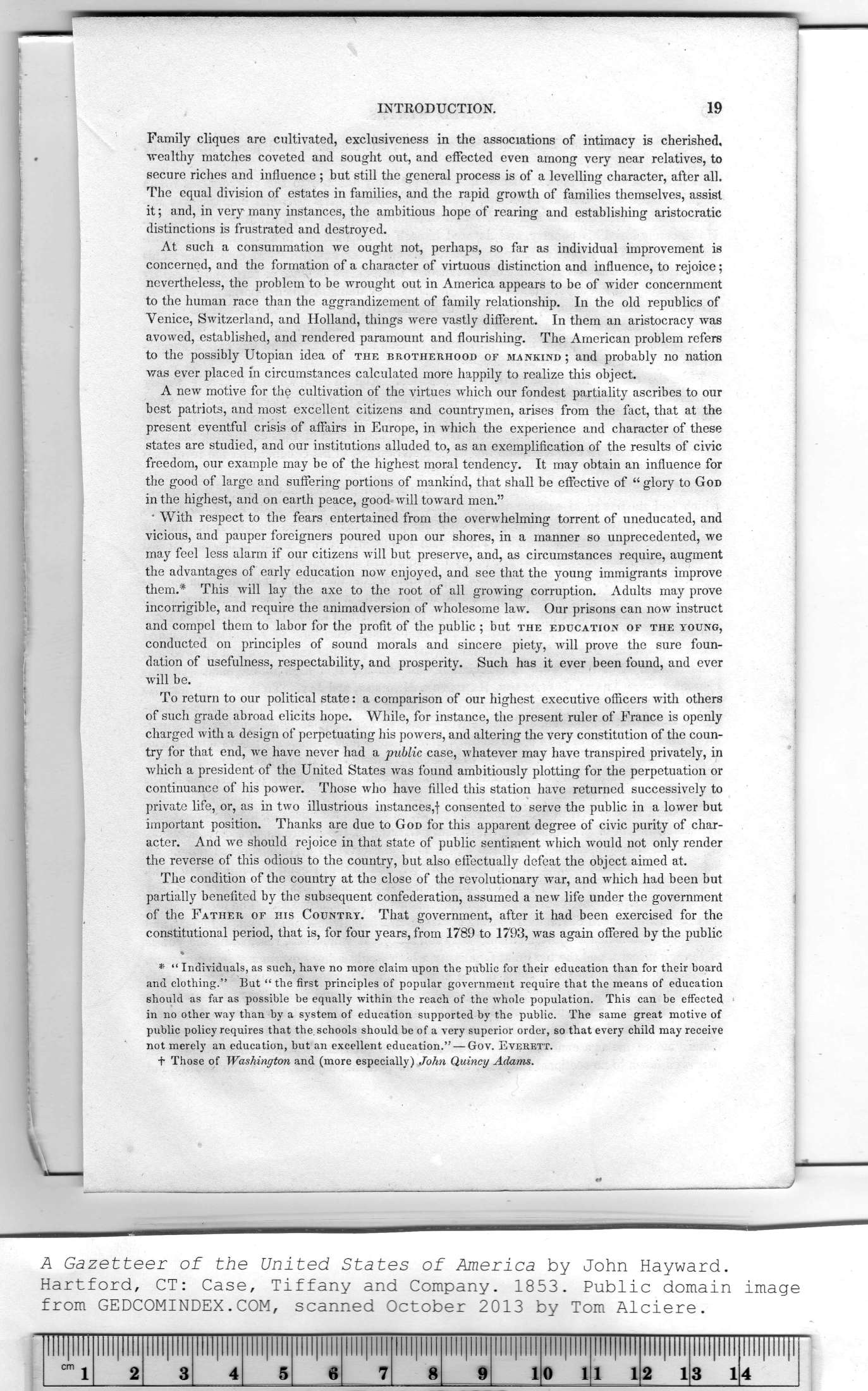|
|
Note: Ctrl and + increases the font size of the text below, Ctrl and - decreases it, and Ctrl and 0 resets it to default size.
INTRODUCTION. 19
Family cliques are cultivated, exclusiveness in the associations of intimacy is cherished,
wealthy matches coveted and sought out, and effected even among very near relatives, to
secure riches and influence ; but still the general process is of a levelling character, after all.
The equal division of estates in families, and the rapid growth of families themselves, assist
it; and, in very many instances, the ambitious hope of rearing and establishing aristocratic
distinctions is frustrated and destroyed.
At such a consummation we ought not, perhaps, so far as individual improvement is
concerned, and the formation of a character of virtuous distinction and influence, to rejoice;
nevertheless, the problem to be wrought out in America appears to be of wider concernment
to the human race than the aggrandizement of family relationship. In the old republics of
Venice, Switzerland, and Holland, things were vastly different. In them an aristocracy was
avowed, established, and rendered paramount and flourishing. The American problem refers
to the possibly Utopian idea of the brotherhood of mankind ; and probably no nation
was ever placed in circumstances calculated more happily to realize this object.
A new motive for the cultivation of the virtues which our fondest partiality ascribes to our
best patriots, and most excellent citizens and countrymen, arises from the fact, that at the
present eventful crisis of affairs in Europe, in which the experience and character of these
states are studied, and our institutions alluded to, as an exemplification of the results of civic
freedom, our example may be of the highest moral tendency. It may obtain an influence for
the good of large and suffering portions of mankind, that shall be effective of “ glory to God
in the highest, and on earth peace, good will toward men."
■ With respect to the fears entertained from the overwhelming torrent of uneducated, and
vicious, and pauper foreigners poured upon our shores, in a manner so unprecedented, we
may feel less alarm if our citizens will but preserve, and, as circumstances require, augment
the advantages of early education now enjoyed, and see that the young immigrants improve
them.* This will lay the axe to the root of all growing corruption. Adults may prove
incorrigible, and require the animadversion of wholesome law. Our prisons can now instruct
and compel them to labor for the profit of the public ; but the education of the toung,
conducted on principles of sound morals and sincere piety, will prove the sure foun-
dation of usefulness, respectability, and prosperity. Such has it ever been found, and ever
will be.
To return to our political state: a comparison of our highest executive officers with others
of such grade abroad elicits hope. While, for instance, the present ruler of France is openly
charged with a design of perpetuating his powers, and altering the very constitution of the coun-
try for that end, we have never had a public case, whatever may have transpired privately, in
which a president of the United States was found ambitiously plotting for the perpetuation or
continuance of his power. Those who have filled this station have returned successively to
private life, or, as in two illustrious instances,! consented to serve the public in a lower but
important position. Thanks are due to God for this apparent degree of civic purity of char-
acter. And we should rejoice in that state of public sentiment which would not only render
the reverse of this odious to the country, but also effectually defeat the object aimed at.
The condition of the country at the close of the revolutionary war, and which had been but
partially benefited by the subsequent confederation, assumed a new life under the government
of the Father of his Country. That government, after it had been exercised for the
constitutional period, that is, for four years, from 1789 to 1793, was again offered by the public
* “ Individuals, as such, have no more claim upon the public for their education than for their board
and clothing." But “ the first principles of popular government require that the means of education
should as far as possible be equally within the reach of the whole population. This can he effected
in no other way than by a system of education supported by the public. The same great motive of
public policy requires that the. schools should be of a very superior order, so that every child may receive
not merely an education, but an excellent education." — Gov. Everett.
+ Those of Washington and (more especially) John Quincy Adams.
|
lllllllll |
lllllllll |
llll|llll |
milllll |
llll llll |
llll|llll |
llll llll |
llll|llll |
lllllllll |
llll|llll |
lllllllll |
lllllllll |
lllllllll |
llUjllll |
!lll|!lll|l |
|
cm j |
2 |
3 |
4 |
5 |
6 |
7 |
8 |
9 |
1 |
0 1 |
1 1 |
2 1 |
3 1 |
4 |
|
